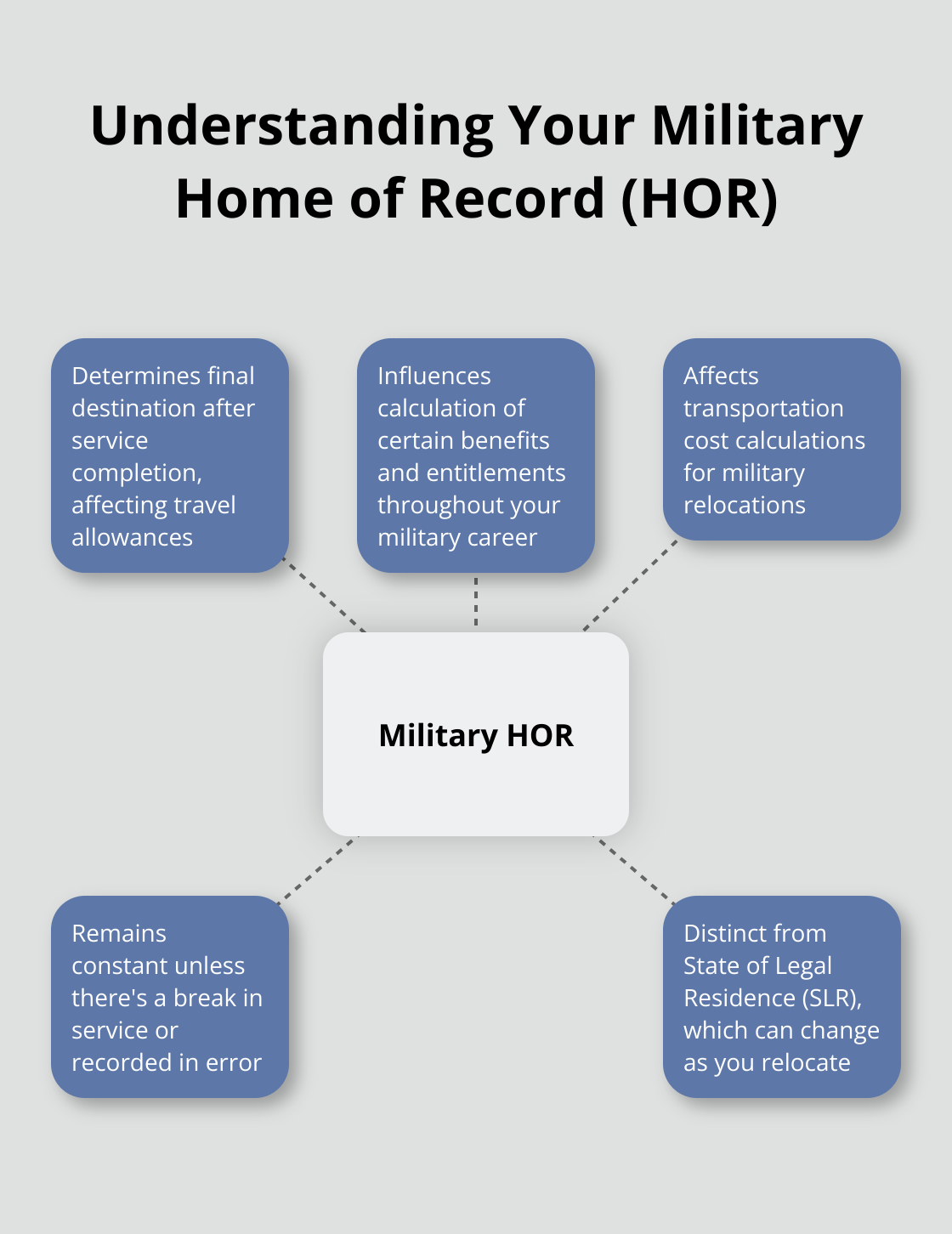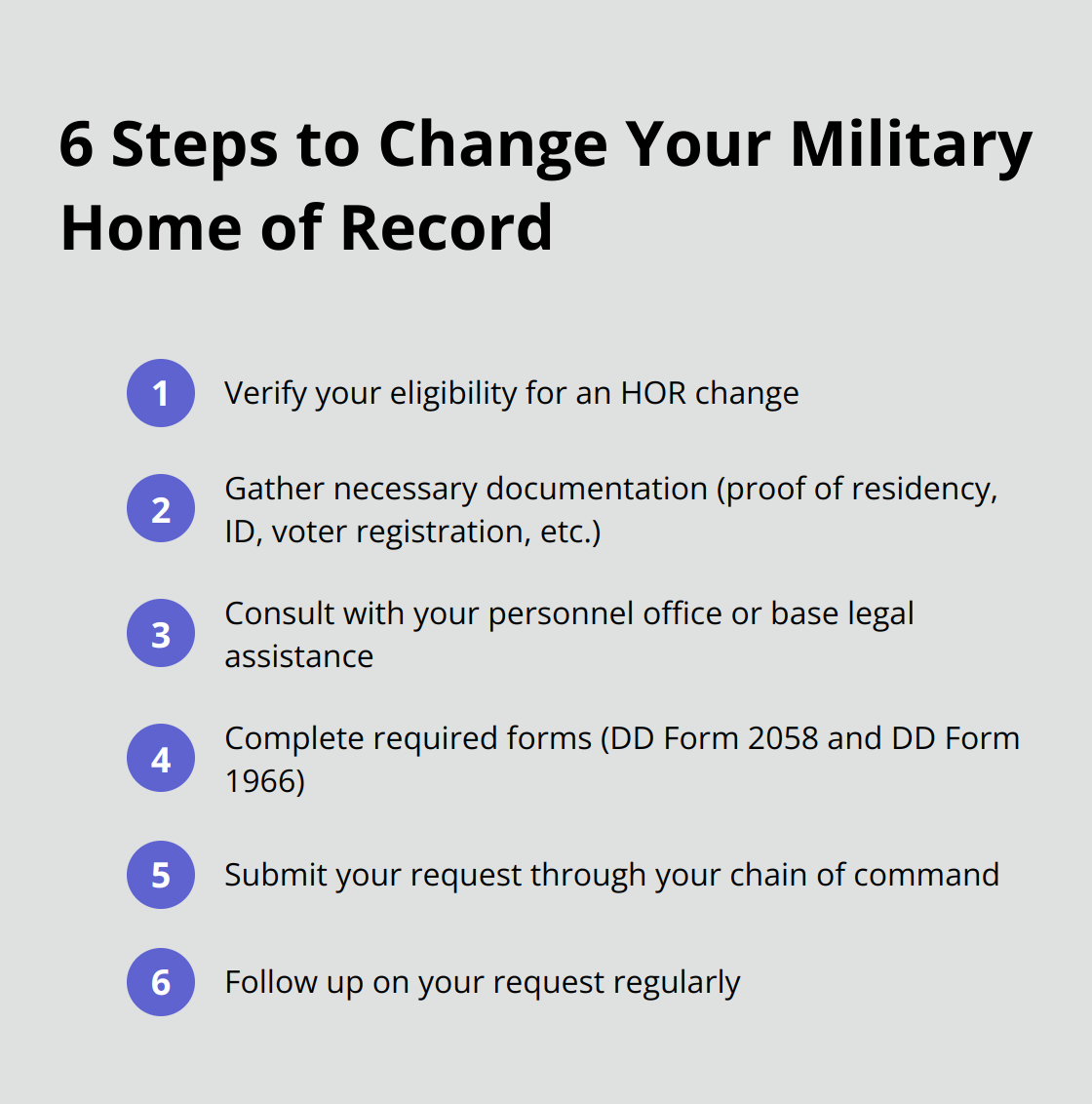At Southbay Moving Systems, we understand the complexities of military relocations, including the crucial aspect of changing your military home of record.
Your home of record (HOR) plays a significant role in various aspects of your military career and benefits. Whether you’re considering a military home of record move for tax purposes, voting rights, or educational opportunities, it’s essential to understand the process.
In this guide, we’ll walk you through the steps to change your HOR and highlight the key reasons why you might want to make this important update.
What Is a Military Home of Record?
Definition and Significance
A military Home of Record (HOR) is a military administrative term used to determine specific military entitlements, such as the calculation of transportation costs. This designation carries significant weight, influencing various aspects of a service member’s career and benefits.
Impact on Military Career
Your HOR determines your final destination after completing your service, affecting your travel allowances. It also influences the calculation of certain benefits and entitlements throughout your military career.
HOR vs. State of Legal Residence
It’s important to distinguish between your HOR and your State of Legal Residence (SLR). While your HOR remains constant (unless you have a break in service), your SLR can change as you relocate. Your SLR affects where you pay taxes, vote, and receive in-state tuition benefits for dependents.
Changing Your HOR
Changing your HOR isn’t a straightforward process. You can only change your HOR if it was recorded in error or when you begin a new active duty period. A reenlistment does not qualify for changing your HOR.
Statistics and Considerations
The low percentage of service members who change their HOR underscores the importance of understanding your HOR when you first enlist.
As you consider the implications of your HOR (and potential changes to it), remember that professional moving services can help streamline your relocation process. Whether you’re changing your HOR or SLR, expert movers (like those at Southbay Moving Systems) can handle the logistics of your move, allowing you to focus on the administrative aspects of your transition.

Now that we’ve covered the basics of what a military Home of Record is, let’s explore the reasons why you might want to change it.
Why Change Your Military Home of Record?
Financial Advantages
The primary motivation for a military Home of Record (HOR) change often stems from potential tax benefits. States like Texas and Florida offer no state income tax, which can lead to substantial savings for service members. The Military Officers Association of America estimates that a service member earning $50,000 annually could save up to $2,500 per year by changing their HOR to a no-income-tax state.
Civic Engagement Opportunities
Your HOR affects your ability to participate in local politics and have your voice heard. A change to your HOR to a state where you plan to settle long-term allows you to vote on issues that directly impact your future community. This becomes particularly important as you approach retirement from military service.
Educational Benefits for Dependents
Many states provide in-state tuition rates or other educational benefits to military dependents based on the service member’s HOR. The Texas Hazlewood Act offers qualified veterans, spouses, and dependent children up to 150 hours of tuition exemption at public institutions of higher education in Texas. A change in your HOR to a state with generous education benefits could potentially save you tens of thousands of dollars on your children’s college education.

Career Opportunities
Your HOR can influence post-military career prospects. Some states offer better job markets or industry-specific opportunities that align with your skills and experience. A strategic HOR change could position you for a smoother transition to civilian life and potentially more lucrative employment options.
Quality of Life Considerations
Different states offer varying lifestyles, cost of living, and amenities. An HOR change to a state that better suits your long-term goals and preferences can significantly improve your quality of life. Factors such as climate, outdoor activities, cultural offerings, and proximity to family often play a role in this decision.
The decision to change your military Home of Record requires careful consideration. The process can be complex and may have unintended consequences. Consultation with your military personnel office and a financial advisor is highly recommended before you proceed with any changes. As you weigh these factors, you might also need to consider the logistics of a potential military relocation. This brings us to our next section, where we’ll outline the steps to change your military Home of Record.
How to Change Your Military Home of Record
Verify Your Eligibility
You can only change your Home of Record (HOR) if it was initially recorded in error or when you start a new period of active duty service. A simple reenlistment does not qualify for an HOR change. Check your eligibility before you proceed.
Gather Your Documentation
Collect all necessary documents to support your HOR change request. These typically include:
- Proof of residency in your new state (utility bills, lease agreement)
- New state driver’s license or ID card
- Voter registration card from the new state
- Bank statements showing transactions in the new state
- Tax returns from the previous year
The more documentation you provide, the stronger your case for an HOR change will be.
Consult with Your Personnel Office
Schedule an appointment with your unit’s personnel office or the base’s legal assistance office. These professionals will provide guidance specific to your branch of service and situation. They will review your documentation and advise you on any additional steps or forms required.
Complete the Necessary Forms
The exact forms you need to fill out vary depending on your branch of service. However, you will likely need to complete:
- DD Form 2058 (State of Legal Residence Certificate)
- DD Form 1966 (Record of Military Processing)
Fill these forms out carefully and accurately. Any errors or inconsistencies could delay your request or lead to its rejection.

Submit Your Request
Once you have gathered all necessary documentation and completed the required forms, submit your request through your chain of command. This typically involves:
- Submitting your package to your immediate supervisor
- Having it reviewed and approved at each level of command
- Final submission to your service’s personnel headquarters
The process can take several weeks to months (depending on your branch of service and the complexity of your case).
Follow Up on Your Request
Don’t assume that no news is good news. Check on the status of your request regularly through your chain of command or personnel office. If you haven’t heard anything after 30 days, inquire about the progress of your application.
Changing your military Home of Record is a significant step that can impact various aspects of your service life and beyond. While the process may seem challenging, proper preparation and persistence can lead to a successful outcome. If you plan a physical move along with your HOR change, consider enlisting the help of experienced movers who understand the unique needs of military relocations.
Final Thoughts
Changing your military Home of Record impacts various aspects of your service life and future benefits. This decision requires careful consideration, thorough documentation, and meeting specific eligibility criteria. The potential advantages, such as tax benefits and educational opportunities, must be weighed against any long-term implications.
We strongly advise you to consult with your military personnel office or legal assistance team before initiating a military Home of Record move. These professionals will provide guidance tailored to your specific situation and branch of service. They will help you navigate the complexities of the process and ensure you make an informed decision.
If your HOR change involves a physical relocation, professional moving services can ease the transition. At Southbay Moving Systems, we offer personalized services for military relocations. Our team understands the unique needs of service members and strives to provide a smooth moving experience.




